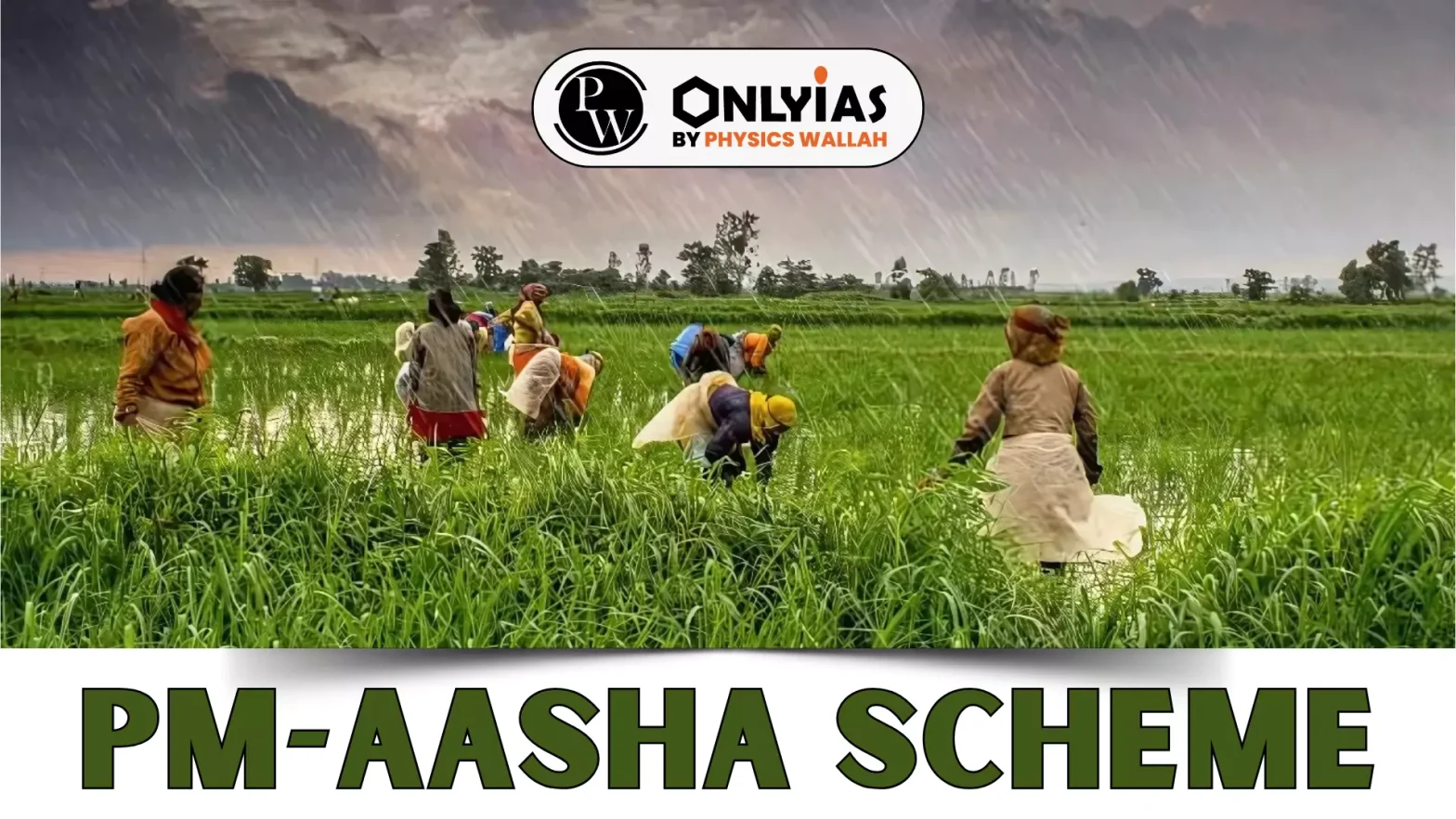PM-AASHA Scheme supports farmers with assured MSP procurement. Understand how the PM-AASHA Scheme helps in price stability, reducing distress sales, and enhancing market efficiency.

PM-AASHA Scheme (Pradhan Mantri Annadata Aay SanraksHan Abhiyan) is a government initiative aimed at ensuring remunerative prices for farmers. Launched in September 2018, this scheme strengthens the procurement process for pulses, oilseeds, and copra, addressing concerns related to price fluctuations and market instability. The scheme is administered under the Ministry of Agriculture & Farmers Welfare, making it a vital part of India’s agricultural policy.
This detailed overview will explore what is PM-AASHA Scheme, its objectives, components, features, and significance for Indian farmers.
The PM-AASHA Scheme or Pradhan Mantri Annadata Aay SanraksHan Abhiyan, which translates to the Prime Minister’s Farmer Income Protection Campaign is an umbrella initiative designed to guarantee Minimum Support Price (MSP) for key agricultural commodities.
PM-AASHA provides price assurance to farmers and helps mitigate market risks by ensuring that essential crops are procured at fair prices. It primarily focuses on pulses, oilseeds, and copra to encourage farmers to grow these crops and reduce post-harvest distress sales.
PM-AASHA scheme consists of three main components:
| PM-AASHA Scheme Overview | |
| Feature | Details |
| Full Form | Pradhan Mantri Annadata Aay Sanrakshan Abhiyan (PM-AASHA) |
| PM-AASHA Launch Date | September 2018 |
| Administering Ministry | Ministry of Agriculture & Farmers Welfare |
| Objective | Ensure remunerative prices to farmers, reduce price volatility, and strengthen procurement operations for pulses, oilseeds, and copra. |
| PM-AASHA Scheme is Related To | Price assurance and procurement of pulses, oilseeds, and copra. |
| Crops Covered | Pulses, Oilseeds, and Copra meet Fair Average Quality (FAQ) standards. |
| Procurement Agencies | NAFED, FCI, NCCF, and State Agencies |
| PM-AASHA Components | 1. Price Support Scheme (PSS)
2. Price Deficiency Payment Scheme (PDPS) 3. Market Intervention Scheme (MIS) |
| Beneficiaries | Pre-registered farmers selling directly at Minimum Support Price (MSP) through state agencies. |
| Payment Mechanism | Direct payment to farmers for price difference under PDPS; direct procurement at MSP under PSS. |
| Key Update (2024-25) | Procurement of Tur, Urad, and Masur under PSS up to 100% of the state’s production. |
| Flexibility for States/UTs | Option to choose between PSS and PDPS for oilseeds procurement each year. |
| Market Intervention for Perishables | Implemented when prices of perishable crops (e.g., Tomato, Onion, Potato) fall by at least 10% from the previous season. |
| Challenges | Limited implementation, inadequate storage, procurement constraints, and budgetary concerns. |
| Continuation | Approved for continuation till 2025-26 under the 15th Finance Commission Cycle. |
The primary objective of the PM-AASHA Yojana is to:
The PM-AASHA Scheme is related to agricultural price support and farmer income security. It aligns with the government’s broader goal of:
The PM-AASHA Scheme was launched in September 2018 under the Ministry of Agriculture & Farmers Welfare and is implemented in collaboration with state agencies and central nodal agencies like:
The PM-AASHA Yojana consists of three major components, each designed to address different aspects of agricultural price support:
The PM-AASHA Scheme features make it an important part of India’s agricultural policy. Some key highlights include:
The Government of India has extended the PM-AASHA Scheme until 2025-26, enhancing its components to include the Price Support Scheme (PSS), Price Stabilization Fund (PSF), Price Deficiency Payment Scheme (PDPS), and Market Intervention Scheme (MIS). Along with it Government implemented and focused on the:
PM-AASHA Scheme has played an important role in providing price assurance to farmers and stabilizing the market for pulses, oilseeds, and copra:
While it has benefited millions of farmers through MSP procurement and price deficiency payments, challenges such as:
The PM-AASHA Scheme is a crucial step towards farmer income security and agricultural market reform. By ensuring MSP-based procurement and offering price deficiency payments, the scheme provides financial stability to farmers. However, expanding crop coverage, improving storage facilities, and simplifying the registration process will be key to making the scheme more effective in the coming years.
The PM-AASHA Scheme ensures MSP-based procurement for farmers, reducing distress sales and enhancing income security.
It guarantees Minimum Support Price (MSP) through various procurement mechanisms, securing fair prices for crops.
It includes the Price Support Scheme (PSS), Price Deficiency Payment Scheme (PDPS), and Private Procurement & Stockist Scheme (PPSS).
All registered farmers growing MSP-notified crops can benefit from the scheme’s procurement and price support.
PDPS compensates farmers for selling crops below MSP by paying the price difference directly into their bank accounts.
Yes, under PPSS, private entities can procure crops at MSP, ensuring better market participation and price realization.

<div class="new-fform">
</div>